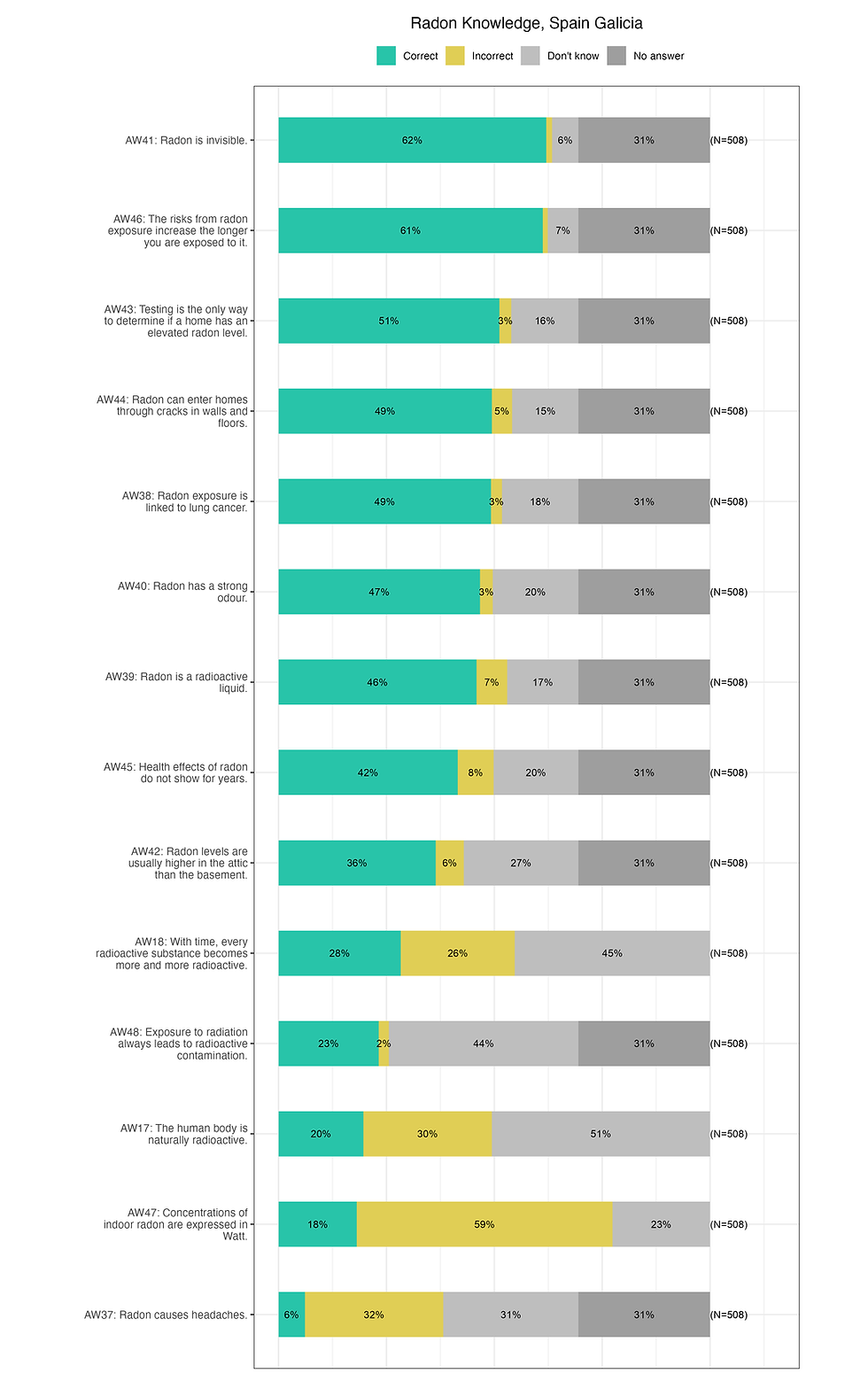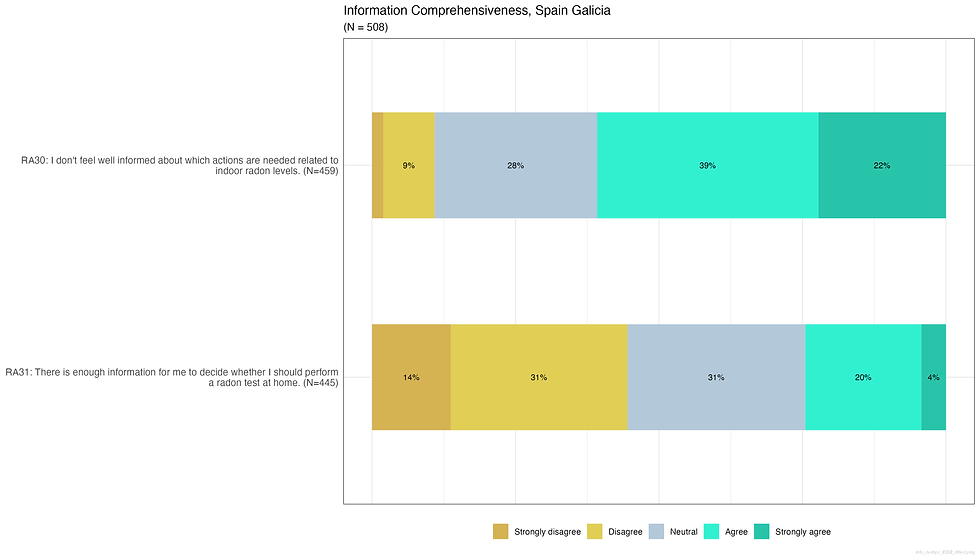Radon protection behaviour
Do people in Galicia test and mitigate?
.png)
.png)
.png)
.png)
Trustworthiness of radon stakeholders
Who in Galicia is recognized as a trustworthy source of information about radon risks?


Findings for
Spain - Galicia
Spain - Galicia
Cite as:
Perko T. (2025): RadoNorm European Radon Behavioural Atlas: Spain - Galicia, H2020 project RadoNorm, No 900009 https://www.radonorm.eu/
Methodology
Computer-Assisted Personal Interviews (CAPI) were conducted in Galicia using an online panel provided by the marketing research company Netquest. A non-probability quota sampling method was used to obtain a sample broadly representative of the adult population (aged 18 and older) in Galicia, with respect to gender, age, level of urbanisation, and province or administrative region.
Sampling was carried out using randomized quotas based on panel quality criteria. Panellists were individually invited with a unique access code and received up to two reminders if they had not yet participated. Sampling quotas were determined based on expected response rates across socio-demographic groups. To address underrepresentation, additional respondents were recruited—within the limits of the available panel—to meet the predefined quotas. Deviations from the target population were corrected through weighting, resulting in a weighting efficiency of 9.915%. A weighting variable is included in the dataset.
Data collection began with a soft launch (N = 85) on January 20, 2023, followed by the main fieldwork on January 23, 2023. The fieldwork was conducted by Netquest in compliance with the European Union’s General Data Protection Regulation (EU-GDPR) and the ESOMAR guidelines for market and social research.
The final sample consisted of 508 respondents, yielding a response rate of 67.17%. The average time to complete the questionnaire was approximately 20 minutes.
The questionnaire was jointly developed by the RadoNorm project and MERIENCE, an environmental and sustainability consultancy based in Barcelona, which also provided the Spanish translation. Data analysis was performed by SCK CEN in Belgium. Data are available at: DOI:10.20348/STOREDB/1179/1309
Download the questionnaire PDF here.
Download the technical report PDF here.
Results
Radon awareness
Are people in Galicia aware of radon?

Intention to protect from radon
What is the public willingness to adopt radon protection measures in Galicia?

Radon Knowledge
How much people in Galicia know about radon?


Risk perception
How do people in Galicia perceive radiological, radon and other risks?

Knowing radon stakeholders
Which stakeholders related to radon are known to Galicians?

Truthfulness of radon stakeholders
Who in Galicia is recognized as a trustworthy source of information about radon risks?


Which stakeholders involved in radon mitigation in Galicia are recognized as technically competent?
Competence of radon stakeholders


Severity
What are people's beliefs regarding the seriousness of negative consequences due to radon?

Susceptibility
Do people in Galicia believe that radon increases the likelihood of health consequences?

Response efficacy: remediation
Do individuals believe dwelling remediation is effective in reducing radon concentrations?

Self-efficacy
Do residents in Galicia have confidence in their own ability to conduct radon testing and mitigation effectively?



Perceived behavioural control: financial and other burden and ease
Is radon testing and mitigation perceived as a financial or other burden?




Aesthetic impact of remediation works on a dwelling
Do residents believe that radon mitigation would visually harm their homes?

Social influence
What are the attitudes of respondents regarding social influence?

Anticipated emotions
What emotions do Galicians anticipate feeling if they do not take action against high indoor radon levels?

Economic impact of radon on a property value
Does a radon problem in a building negatively impact its financial value?

Moral values
To what extent do people agree with statements reflecting moral values?

Moral norms
To what extent do Galicians believe it is their moral duty to protect themselves and others from radon exposure?

Descriptive norms
Is radon testing and mitigation a common practice within social groups?

Subjective norms
Do family members and friends of resopondents care about radon-related issues?




Health effect perception
Do individuals have acquaintances who may have experienced health issues as a result of radon exposure?

Stigma
Is there a risk of stigma associated with radon in dwellings?

Information processing
How do people process information about radon?


Information comprehensiveness
Is there enough information readily accessible?

Information uncertainty

Is there too much uncertainty to make informed decisions?
Affective response to information
Does information related to radon elicit negative emotions?

Preference for post-survey radon-related information
Which communication channels are recommended for radon-related communication?

